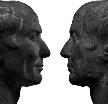Rian Malan praises Jonny Steinberg’s Winnie & Nelson: Portrait of a marriage (see here). Rightly so. Steinberg has produced a most important record. His usual deep and wide research, insightful analysis and interpretation is presented in a very readable format.
Rather than repeating old mythologies he brings context to enable us to more clearly see the conflicting arguments and nuances and gain a better grasp of this important era of our history, a clearer understanding of the complexities inside and outside of the ANC and other organisations and currents in South Africa, and the world more widely.
p369 “To this author (Steinberg, and this reader), Nkadimeng (and Steinberg) told a more detailed and complex story.” than what Malan apparently finds here.
Despite highly lauding the book, one wonders whether Malan really read it and understood the complexities. He rather appears too eager to only seek confirmation of old prejudices.
Malan focusses on the thuggish behaviour, the bullying, the corruption from the earliest.
But he appears to miss the deeper, more complex story: the desperately bloody conflict from 1984, but even more bloody following the unbanning of the ANC and other organisations and the involvement of the government at the time, the ANC and others in this. He appears to mis the context of the “violence of the world without mirrored the violence of the world within.” P453
Why is he so concerned with the SACP, like the apartheids regime back then? Perhaps the way he lauds F W de Klerk as a “hero of our time” in The Spectator of 11 November 2021 partly explains that?
Steinberg remarks "It seemed that Winnie had been handed an unenviable place in history: she would stand as a monument to the revolution's underbelly, a reminder of lives lost for nothing." p461
p416 “The politics of the marriage now gave off a whiff of comedy. For Nelson, the revolution had now entered Thermidor. The fervour of the last quarter century was to be doused, the young reeled in. Such thoughts were horrifying to Winnie Mandela. The starched obedience, the deference to stale authority: she rebelled against these from the depths of her being.”
Steinberg quotes Barbara Masekela: p429 "He was in many ways an old gentleman from the past. So I see poor Winnie. She is meant to return to being the woman in love. She has had other experiences, has met other people. Now there has to be dinner on the table. Can you imagine?"
May I suggest that Malan reads Koleka Putuma’s poem 1994: A Love Poem which Steinberg quotes on p 462 again with a more open mind rather than simply dismissing it as fallist. How does he understand the story of former security policeman Paul Erasmus, or that of Methodist priest Gary Rivas who, as a conscript, served as a parabat in the “notoriously violent” counter-insurgency operations?
Malan’s imagination appears to sorely fail him. And, while initially praising the book, he becomes embroiled in the old myths.
Rather read the book yourself and don’t be misled by this shallow interpretation.

